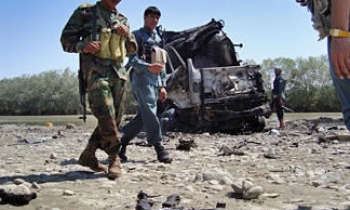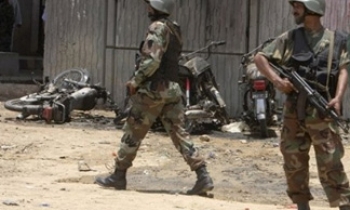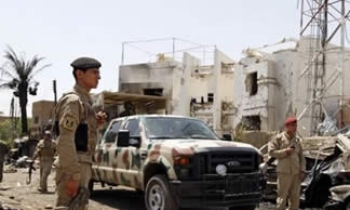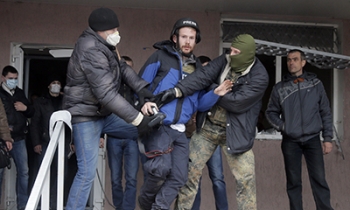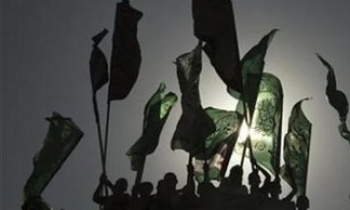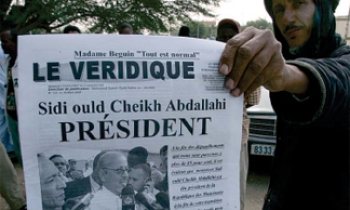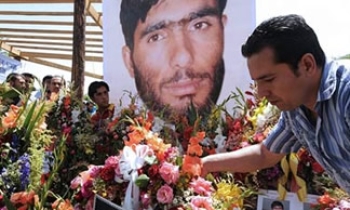It doesn't take much to get Mahmood Al-Yousif's juices flowing, to get him steamed at the latest moves by the Ministry of Information (MoI) in Bahrain. Al-Yousif, 43, is the first prominent blogger in the tiny archipelago in the Persian Gulf and runs a technology company there called Computer Point. After the MoI announced it wanted all Web sites and blogs to register with the government, Al-Yousif didn't hold back.
"They think that they are putting in more controls," he told me. "More important to them is keeping tabs on thoughts. The Ministry of Information's main purview is making sure ... they are there as a censorship office for the local papers as well as international papers. They are there as spin doctors for any article that comes up for or against the Bahraini government. Rather than being a facilitator for creativity, they are the creativity graveyard."
Al-Yousif sent me an e-mail with his thoughts on how upset he was with the registration drive and how he would never register. Then he posted those thoughts to his blog, Mahmood's Den, which acts as more of a news and conversation hub. And most prominently, he displayed Article 19 of the Universal Declaration of Human Rights at the top of his blog as the reason he is not registering with the government -- along with a Creative Commons license, with the tagline, "I don't need the MoI's protection, thanks very much!"
Bahrain finds itself in the stutter-start of democratic reform, a longtime emirate which shifted gears in 1999 when Sheikh Isa died and a more liberal prince, Hamad bin Isa Al Khalifa, took over. Political prisoners were freed, and a new constitution allowed for elections to a lower house of parliament in 2002, but the new king retained power to appoint an upper house of parliament, the prime minister and cabinet and all the judges.
The country's population is about 700,000 total, with a literacy rate of almost 90%, more than half owning cell phones and nearly 200,000 Internet users in 2003, according to the CIA Factbook on Bahrain. As in Iraq's history, Bahrain has a majority of Shi'ite Muslims but is ruled by Sunni Muslims.
While the U.S. considers Bahrain to be an important ally, with the U.S. Navy's Fifth Fleet based there as a jumping off point during the second Iraq War, Bahrain has backslid on its program of reforms, especially with regards to the Internet. There are laws restricting freedom of press, the MoI has given all Web sites six months to register with the government, and three proprietors of the popular Bahrainonline.org forum were arrested in February.
While blogger Juan Cole complained that the American media hasn't been paying much attention to Bahrain -- including protests by Shi'ites for constitutional reform -- the Wall Street Journal recently fronted a deep report on problems in Bahrain titled, "After High Hopes, Democracy Project in Bahrain Falters."
Trouble in paradise
While the kingdom has seen a surge of tourism from other Arab countries since its liberalization, the recent bad publicity from the registration drive and the Bahrainonline arrests show that reform isn't easy.
Dr. Nasser Qaedi is a media attaché in the Foreign Press Affairs office at Bahrain's Ministry of Information. He denied that there was a trend toward curtailing freedom of expression online and said that the two incidents were not related and come from different parts of the government.
"This [Bahrainonline] case has nothing to do with the Ministry of Information," Qaedi told me. "The Ministry of Justice is in charge of that, and we don't know the update of the case. We felt that the registration procedure following the Bahrainonline case presented the image that it's related somehow, but it's not. When things like the Bahrainonline case happen, it's not necessarily a reflection of where the kingdom is headed. It doesn't mean there's a trend or anything like that. We're still pushing ahead, we're currently in the process of labor reform and extending more labor rights."
When the Bahrainonline trio -- Ali Abdulemam, Mohammed Al Mousawi and Hussain Yousif -- were held in prison for 15 days, Bahraini bloggers and forums helped bring international attention to the story while also covering protests and rallies in new ways that the traditional media couldn't.
"[The forums] have mechanisms for when you go to demonstrations," Al-Yousif told me. "They moblog when you go to demonstrations. They take pictures from their phones or from their digital cameras [and post] to the forums very very quickly. There's a running update. It's almost like there's a guy with a computer and a headset, and a guy with a mobile at the demonstration giving him the scene, and the other guy is writing it."
One South Asian citizen who has spent his whole life in Bahrain runs a Weblog under the pseudonym Chan'ad Bahraini. When there were protests against the arrests, Chan'ad ran a powerful eyewitness commentary with colorful photos from the demonstration, which was eventually called off when riot police showed up.
Though the trio are free now, they cannot travel from the country and might still face a trial. Meanwhile, bloggers have been worried about the MoI's registration drive and what the government might do to them next.
"I wouldn't say that Bahraini bloggers are living in fear, however it was quite worrying when Ali Abdulemam was arrested," Chan'ad told me via e-mail. "Nonetheless, I think we all write quite freely without much self-censorship. The only self-censorship I do is to make sure I don't have any vicious personal attacks against members of the royal family ... but there is plenty of civilized criticism of them."
Al-Yousif says he doesn't read the forums, which he says have become addictive for many young people in Bahrain to "rant and rave." He says the main government Internet provider, Batelco, now offers ADSL high-speed access, which is then distributed throughout villages on the sly through what is called "ThiefNet." Al-Yousif believes that if the government does clamp down on bloggers and forums, the Netizens will just operate anonymously and continue in the cat-and-mouse game of getting to blocked sites through proxy servers.
"Everything that comes through Bahrain is cached," Al-Yousif said. "So [the government knows] the source IP -- where it came from -- and the destination IP because everything goes through [Batelco] so it's very easy to do a database query to find out where that material is destined to. That's one of the major things they've invested in, and it's also the major thing that slows down the Internet [in Bahrain]. But there are services available for us to fool the system. We can set up proxy servers on our own systems, so it looks like a Chinese service requesting information through Batelco. What they'll have to do is have to get more sophisticated, but then the users will get more sophisticated to defeat them. It's a Catch-22 situation that's pointless."
While a recent report by the OpenNet Initiative on Bahrain's Internet site-blocking showed only a small percentage of sites were blocked in-country -- some porn sites and Bahrainonline -- bloggers say that the government has been taking more measures to block sites, including proxy servers.
"After the announcement of the Web registration drive a couple weeks ago, it seems the government has been working harder to make sure that blocked sites stayed blocked," Chan'ad said. "Previously, it was extremely easy to access a blocked site by using one of the many free proxy servers or by going through sites such as Proxify.com. But now most of these have all been blocked too, so it's getting tougher to access blocked sites."
How free is the press?
When it comes to press freedom in Bahrain and other Gulf countries, contradictions abound. The history of the media has been one of tight state control and censorship, only recently loosened by satellite TV such as Al-Jazeera and Internet access to blogs and forums. Bahrain and the United Arab Emirates have been at the forefront of liberalization of press freedom in the Gulf, but these are small steps so far.
Qaedi, the government media attaché, made sure to tout the fact that Bahrain was recently chosen to host the Gulf Press Club. "This is a great honor for Bahrain to be a home to journalists and editors from throughout the Gulf countries and is a further indicator of our interests to encourage openness and reporting as well as the growth and development of journalism in Bahrain as part of reform initiatives," Qaedi said. "Hopefully, the establishment of these institutions will help bolster our democratic reform initiatives and be a successful example of our efforts to encourage confidence in Bahrain's progress."
The Gulf Daily News recently blared a front page headline, "The Right to Know," in reference to the Prime Minister's meeting with the Bahrain Journalists' Association. "As long as it is honest and in the national interest, freedom of the press will not be touched," he said.
However, not mentioned in the article is Law 47, passed in 2002, which restricts the rights of journalists and threatens fines, prison terms or publication closure for "blaspheming the King, denigrating the state religion, propagating national disunity and sectarianism, or calling to overthrow the political regime."
Qaedi explained some of the government's concerns with online speech.
"People are free to express their opinions on the Internet," he said. "It's just that there are concerns with the type of issues that are presented. Some of these forums, they say things that perpetuate false information. For example, they stir up false accusations. That's what the government is concerned with. It's not that they don't like to hear critiques -- not at all. For example, there are a lot of groups on the Internet that are advocating hate against individuals in the government. You never know where these things will lead. Imagine in the U.S. if someone threatened people from the Bush administration online. Bahrain understands these issues, and it's a transitional democracy, and these issues are inevitable. Not everyone is going to like what everyone else has to say, but that's the way it is in a democracy, we understand that."
The Gulf Daily News itself has become a more liberal outlet for news, and its news editor Amira al-Hussaini has penned some eye-opening screeds against limits to democracy in Bahrain.
"Why is Bahrain stubbornly disrespecting its citizens and refusing them space to breathe and develop and learn to respect themselves and others in the process?" al-Hussaini wrote in a column on the registration drive. "Democracy is not born overnight. It is a long learning process and trial and error are acceptable as long as mutual respect and the will to make things work for the benefit of all are there. Is freedom of expression just a sound bite under our own version of Bahraini democracy?"
Though she has more freedom to write in her newspaper column than almost all Bahraini journalists before her, al-Hussaini also keeps a Weblog under the pseudonym Silly Bahraini Girl to write with even less constraints. Despite the breezy title, al-Hussaini has taken on deeper issues on her blog, and has even set up a blog called Free Ahmed to highlight the plight of a friend who's been in jail without a trial for the past year.
"I self-censor myself [in the newspaper], but not because of fear, but because of understanding of the culture," al-Hussaini told me. "The media hasn't been very outspoken, but it's been more outspoken that it has ever been in the past. Five years ago you wouldn't imagine that we could get away with everything that we write now. To the Western media, it's not that big of a deal, but to the Bahraini people where everyone knows everyone, there is the Arab tradition, the respect for the elders for the ideology. To come out and say that this is wrong and this shouldn't be done is sort of taboo -- not because of the government laws but because of the culture and traditions and respect."
While Arabic forums such as Bahrainonline have been hugely popular -- and do break news as well -- the blogosphere there still operates somewhat under the radar of authorities, especially the English-language ones. There's a nice blog index called Bahrainblogs.com, and when reading the blogs, you notice how much the bloggers comment on each other's posts. The tight-knit group has even started monthly Meetups to see each other face to face. Al-Yousif told me there has even been a government representative joining the bloggers to hear their views on censorship and registration.
Al-Yousif believes that Bahrain is a place where back-room deals get you much further than agitating on the streets. He says that a meeting with a well-placed prince could help the bloggers' cause in changing the registration rule much more than an online petition.
"If we can get quite a few of the unanonymous bloggers to come forward, we can write a letter or meet with one of the various princes who have some kind of influence," Al-Yousif said. "So he would go and mention this to the Ministry of Information indirectly. Everything is done in this country indirectly. Nothing is done as a direct action ... If you go confrontational, the only thing that will happen is you will get a severe reaction. They would confiscate your material. It's just not worth doing it like that. And that's probably true in the whole Arab world. You would have to shake some hands, kiss some sheiks and get your own group going."
John Elan is a blogger who grew up in Bahrain but now lives in the United States. He told me the government is vulnerable to international pressure, but might take action to silence online voices in more discreet ways -- relatives harassed, loans denied, job promotions rejected.
"This is a democratic experiment that has to work," Elan told me via e-mail. "Whatever happens in Bahrain will be what other nations in the region will emulate. If it turns out to be a sham in Bahrain, the other nations will install sham democracies. If it turns out to be a genuine system, then other nations will feel the pressure from their own people to install a genuine system of participation and fairness. That's what is at stake and the West must do what it can to preserve a favorable outcome."

